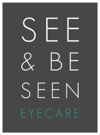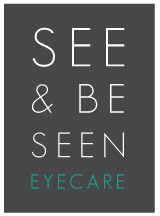Night driving can be more hazardous than daytime driving. Reduced visibility and glare from oncoming headlights and streetlamps can make it difficult to assess road conditions.
To help reduce glare, some individuals may use night driving glasses. They have yellow lens tint, can be bought over the counter, and don’t usually contain a vision prescription. But, these night driving glasses aren’t always a reliable solution for night driving because the yellow tint may actually reduce visibility in low light.
Anti-reflective glasses can help avoid driving hazards with nighttime driving. These prescription eyeglasses have a unique lens coating that reduces distracting glare from lights and oncoming traffic.
What is Night Blindness?
The human eye works differently at night. Cones, the cells responsible for color vision, become less useful, leaving the rods to pick up the slack. Rods excel in low light. They can only discern between black and white and have a poor resolution resulting in low-quality vision resolution.
“Night blindness” is a term for a condition medically known as nyctalopia. It refers to the difficulty or inability to see in dim light or at night. This doesn’t mean an individual can’t see, rather, an individual’s ability to discern shapes, judge distances, and detect colors is compromised.
Night blindness is a symptom of other ocular conditions and it’s not a disease on its own. Common symptoms of night blindness include:
- Blurry or cloudy vision in low light
- Light sensitivity
- Light glare or halos
- Difficulty seeing objects near or far in low light
- Inability to see stars in the sky
- Total vision loss when entering a dark space
What Causes Night Blindness?
Night blindness is a symptom of ocular conditions. Conditions that can cause night blindness can be broken into 2 different categories:
- Not enough light enters the retina: This may feel as if the world is darker and blurrier, and it becomes harder to focus because not enough light enters the retina.
- The retina is not working properly: This occurs when retinal cells don’t properly react to light. Some ocular conditions can cause retinal cells to become weak or not react to light at all.
Night blindness may be a symptom for individuals who have eye conditions such as:
- Cataracts: A clouding of the eye’s natural lens. Cataracts can develop as part of the natural aging process. It affects visual clarity and causes blurriness, glare, and halos. Decreased night vision is a symptom of developing cataracts.
- Glaucoma: Damage to the optic nerve caused by increased eye pressure.
- Macular degeneration: A deterioration of the retina’s central area, the macula. This affects central vision, causes blind spots, and image distortion.
- Keratoconus: A condition where the cornea progressively thins and bulges into a cone shape.
- Retinitis Pigmentosa: An inherited degenerative eye disease that can cause the rod cells to break down. This makes it difficult to see in low light and can lead to tunnel vision and total vision loss.
- Diabetic Retinopathy: This is a result of diabetes damaging the tiny blood vessels in the retina. One of the first signs of diabetic retinopathy is poor night vision.
- Myopia: Distant objects appear blurry during the day and night.
- Refractive Surgeries: Surgeries like LASIK or PRK change the shape of the cornea to help improve vision. This process can affect the way light bends as it enters the eye, resulting in glare and halos.
Night blindness can also be caused by factors such as severe vitamin A deficiency, which leads to dry cornea and can damage the cornea and the retina, and aging. Aging can lead to weakened iris muscles, decreased pupil size, and aging rod cells.
Understanding the cause of night blindness is important to determine treatment options. Some conditions that cause night blindness are curable, like cataracts or vitamin A deficiency, or treatable like myopia and diabetic retinopathy.
Unfortunately, certain conditions that cause night blindness aren’t treatable. Symptoms can be managed by attempting to limit the effects of night blindness. Treatment might include corrective lenses, medication, surgery, or techniques to help adapt to vision loss.
Visiting your optometrist for routine comprehensive eye exams is key to maintaining healthy vision and ocular health. Routine visits can help diagnose, monitor, and treat eye conditions early to prevent serious ocular damage. This involves a series of tests, including ones to assess the reaction of your pupils to varying light levels, your photoreceptors, and visual field testing.
Getting diagnosed with night blindness, and finding the cause for this can help your optometrist determine the appropriate treatment option for your symptoms.

How Eyeglasses for Night Driving Help Night Blindness
If your optometrist determines that the cause of your night blindness may be corrected with specialized anti-reflective (AR) lens coatings.
Anti-reflective Coated Glasses
This lens coating can help reduce glare from oncoming lights and improve vision in the dark which can help to make it easier to see while night driving. Using AR lenses during night driving can greatly diminish light reflections from your lenses, enhancing road visibility.
These lenses facilitate increased light transmission, minimizing light reflection, and reducing undesired halos and glare. As a result, you can experience clearer vision while driving at night.
Anti-reflective lenses can also be purchased with no prescription for individuals who don’t require vision correction to see clearly.
Night Driving Glasses
Night driving glasses are usually non-prescription yellow-tinted lenses that can be purchased over the counter. The tint claims to improve visibility by filtering out blue light that causes glare, and may feel like it improves visual contrast for the wearer.
There are a few risks associated with using night yellow-tinted night driving lenses. Some studies have shown that the yellow tint can block light from entering the eye and reduce visibility. These studies show that wearing these glasses may actually worsen night vision!
Schedule a Visit With Us!
Nighttime driving is especially challenging for individuals with certain eye issues. Even individuals with no diagnosed conditions may find their night vision is less sharp.
Contact our team to schedule a visit, to help determine if AR eyeglasses are the right fit for your night vision needs.





